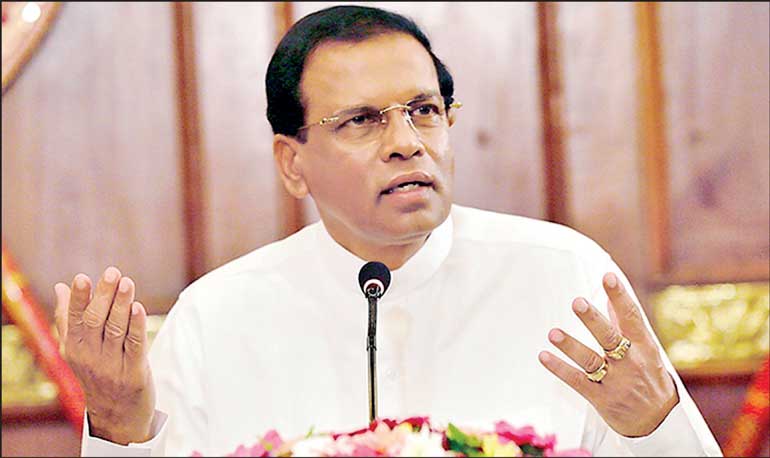Saturday Feb 14, 2026
Saturday Feb 14, 2026
Tuesday, 9 April 2024 00:27 - - {{hitsCtrl.values.hits}}

When former President Sirisena claimed knowledge of the behind the scenes string-pullers of the Easter Sunday carnage, he was being true to the ways and methods of our clan in white native dress
 “I know who did it” Maithripala Sirisena on the Easter bombing
“I know who did it” Maithripala Sirisena on the Easter bombing
“We have met the enemy, and he is us”
Even as long ago as the Greek and Roman eras, playwrights have been engaging with the idea of tragicomedy, the dramatic coexistence of the two opposite elements in the human condition. “All the world’s a stage, and all the men and women merely players” suggested the Bard; characters are inter-changeable, the dramatists introduced men as gods, slaves as masters, a trivialising portrait exemplifying the inherence of the two elements in the one moment, tragedy and comedy. The tragicomedy exaggerates and glorifies the trivial, the banal is presented as climacteric, a burlesque denying authenticity.
By the ‘Ceylon Independence Act’ passed in the British Parliament in 1947 we were set on the path to self-governance. The lamentable story that has unfolded since needs no elaboration; we are only left with eyesores – several constitutions, years of economic stagnation, diminished institutions and political turmoil. Only difference between then and now seems sartorial, the tail coats and top hats of the old leaders replaced by the silky white “native” dress of today’s leaders. Except for a handful, the Ceylonese could not afford tail coats and top hats then, an awkward dress in any event for a poor country in the tropics.
Today’s so called ‘native’ dress is even less native, the overwhelming male population in this country are in shabby long trousers and over-worn, sun bleached shirts. If the tail coats represented a confounded caricature, the present day politician’s shimmering white kurta type dress has come to be a symbol of the lowest kind of career making, accompanied with every kind of corruption.
If Sri Lanka were a private corporation, its performance this 70 years would lead to inevitable conclusions, including; that the aims of the company are beyond its capabilities, it cannot produce the requisite directors, and, the stakeholder expectations are at odds with the company’s limited potential. Hard headed business analysts will see a company on its way to liquidation, sometime or the other.
A nation is not a corporation, yet, some of the elements that go to make a successful company, will also apply to a nation. Like every other human endeavour, leadership is fundamental; the leader’s intelligence, abilities and most importantly, his character are crucial to a nation’s progress. The latter, the leader’s character, defies easy definition. The ill effects of character deficiencies of the leader become apparent only too late, upon his exit the nation is left with diminished human beings, degraded institutions, and perverted values.
When former President Sirisena claimed knowledge of the behind the scenes string-pullers of the Easter Sunday carnage, he was being true to the ways and methods of our clan in white native dress. They have the knowledge; their minds have penetrated the mysteries of the universe and are mysteriously gifted with sweeping visions for the nation; such knowledge/vision equals leadership!
Leaders do not fall from the sky. They are very much a creation of a given society, representing a certain outlook, ethics and beliefs peculiar to that society. In tandem with the common belief in the occult, many Sri Lankans are inclined towards conspiracy theories, tirelessly second guessing the motives of powerful countries and formidable international organisations, viewing the foreigners with suspicion (meanwhile cravenly welcoming the monetary aid given by them, manoeuvring to obtain a passport of a developed country and grabbing the various scholarships they offer!)
We may be embarrassed of our tiny-economy status, rue the country’s limited industrial output and find apologies for their poor quality; our farms may be less productive than those in other countries, our intellectual performances unremarkable and professional attempts wanting; however, when it comes to unravelling wicked plots of hostile foreigners the Sri Lankan deductive logic assumes a velocity of its own. Well aware of this, the politicians are always ready to expand on the next conspiracy theory!
On hearing the word ‘intelligence services’ Sri Lankan ears prick up, hearts beating excitedly. This is James Bond stuff; hush-hush meetings in dark corners, secrets whispered, diabolical instructions given; conspiracies galore!
In reality, the designation could be a misnomer, intelligence services have consistently missed some of the most crucial events in history.
On 7 October (2023) the Hamas group based in the Gaza strip launched a devastating attack on Israel. Israel which claims one of the best intelligence services in the world had no idea of the impending attack. America, commanding the largest intelligence network in the world, was taken by complete surprise on 9/11. In their long and expensive Afghanistan engagement, Americans misread the social/political reality on the ground; the Al-Qaeda is back in power in that forlorn country.
In the early 1990s, the Western powers did not anticipate the sudden fall of the Soviet Block. For decades the Soviet system had been groaning under the heavy burdens of economic stagnation, made worse by unbearable military and other commitments. When India sent troops to Northern Sri Lanka (1987-90) it was surprised by the resistance it faced, and later, was in the dark when the Rajiv Gandhi assassination plot was hatched by the LTTE. In the on-going Ukraine war, the parties concerned- Russia, Ukraine and the West, seem to have made serious miscalculations based on their individual intelligence.
This does not mean that all intelligence gatherings/subversive activity are failures. They have had their share of success too, nothing more or less than the usual government department.
While those who make a career out of these things overplay their importance, the hard-nosed policy-maker may question their success in relation to the resources expended. For a people whose actual achievements are thin, the thrills of espionage may be a welcome escapism to a world of exciting subterfuge. We can ignore all practicalities when we enter this never-never land. For example, an Indian agent (Hindu?) may advise an ardent Muslim to blow himself up with a few hundred other human beings, just so that the country’s economy is harmed! (India is jealous of Sri Lanka’s economic prowess!)
People are extremely pliant in this make believe world, mere automations, carrying out unquestioningly whatever they are told by a handler. They are not autonomous human beings, with a mind of their own or even a desire to live. The handler says do it, and, they do it! In the conspiracy narrations, if a person meets a Muslim preacher he has become a convert, if a man met the American ambassador that is conclusive proof that he is now an American agent!
In the real world things happen differently, there are countless instances of under-ground organisations inveigling funds from a sponsor, only to attack the sponsor eventually. India’s experience with the LTTE was an eye opener for them. Then there are many instances of so called stool pigeons spying on the authorities rather than spying on their behalf. There are turncoats, double agents, and even rogue agents out there. James Bond is straight forward, the good versus the bad, the handsome British agent fighting the disfigured master criminal out to destroy the world.
In the usual scheme of things, intelligence reports and conspiracy theories must be assessed by the political authority, the elected leaders of the country. For the system to function well, these leaders must be sophisticated men with high intelligence and sound character, their minds acting as a sieve to separate the nonsense from the valuable(information).
Although our leaders draw validation from the fact of their election, we are wanting in many other aspects of the democratic process. The inner workings of many of our political parties are shrouded in mystery, the various party committees act as mere rubber stamps. Political funds and donations received by these parties are known only to the leader and his close associates. Party members follow suit; their individual funding sources are kept confidential!
Leadership is a possession, routinely bequeathed to family or clan; a tradition emblematic of a poverty, both of mind as well as culture. However, in Sri Lanka this deplorable practice is held up as a claim to fame; ‘our family has served the poor for three generations’! The poor remain poor, but the family has become incredibly wealthy in three generations!
Having alighted on leadership positions due to family connections or sheer chance, our leaders adopt various stratagems to justify their hold on power. One has vision, the other is practical, the third is patriotic while the fourth may be immersed in the customs and culture of the land; but none speaks of the nation’s bankruptcy, the slow growth rate and the deep social disaffection gripping the country.
For a true picture of our leaders, we must examine the Sri Lanka country report from 1948, in relation to other nations in Asia. A repeating theme of big talk, pretentious poses, yet only small results; a tale told by an idiot…
Woe to the nation unfortunate enough to have only windbags, scoundrels and fools as its leaders!
“And, all our yesterdays have lighted fools, the way to dusty death. Out, out brief candle. Life’s but a walking shadow, a poor player that struts and frets his hour upon the stage. And, then is heard no more. It is a tale told by an idiot, full of sound and fury, signifying nothing” – Macbeth (Shakespeare)